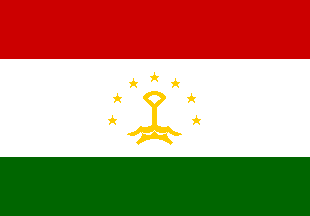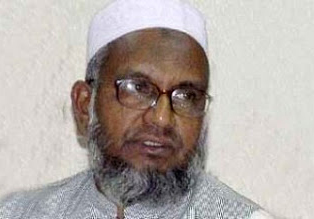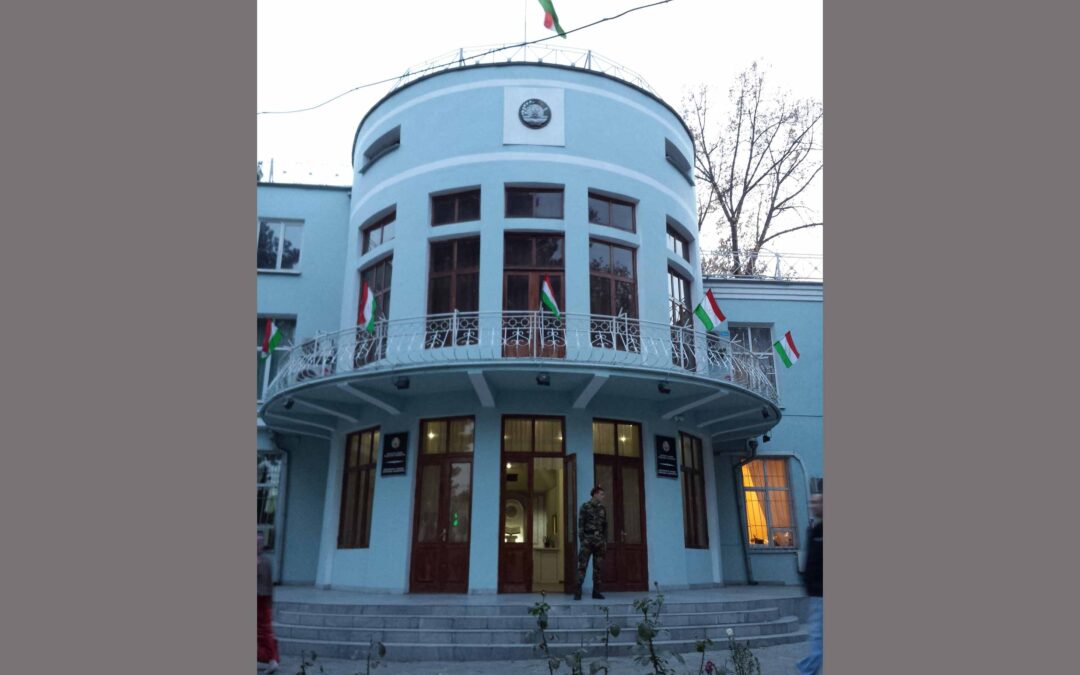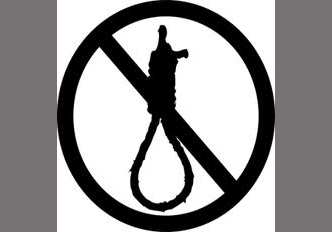
Mar 7, 2014 | News
The ICJ expressed concern at today’s arrest of Fakhriddin Zokirov, a prominent defence lawyer who had represented the former Minister of Industry, Zaid Sayidov.
The former Minister was recently convicted for a number of crimes including polygamy, receiving a bribe, rape, fraud, illegal confinement and sentenced to 26 years of imprisonment.
The ICJ is concerned at reports that the arrest of the lawyer may be related to his active and robust defence of the former Minister in court.
Lawyer Zokirov was arrested by the State Finance Control and Anti-Corruption Agency on charges of fraud in banking transactions, which allegedly took place several years ago.
Two other lawyers who defended the former Minister, Shukhrat Kudratov and Iskhok Tabarov, announced at a press conference that they had recently faced various threats and intimidation in connection with the case.
The lawyers reported that the pressure on them had significantly increased in relation to a lawsuit which they brought against the head of the State Finance Control and Anti-Corruption Agency, Fattokh Sayidov.
They alleged that the head of the Agency threatened that if they did not drop the case, they would “share the dock” with their client, the former Minister.
“Abusive prosecutions of lawyers and threats against them in connection with their work are contrary to international standards on the independence of lawyers and undermine the integrity of the justice system”, Róisín Pillay, Director of the Europe Programme, said today. “In the exercise of their profession, lawyers must remain free from intimidation, harassment, fear and arbitrary prosecution and arrest. The ICJ calls on the authorities of Tajikistan to ensure that lawyers’ integrity is protected, and that the criminal justice system is not misused to intimidate them.”
Under the UN Basic Principles on the Role of Lawyers, lawyers must not be identified with their clients’ causes, and must be protected against attacks and intimidation, including prosecutions or administrative or other sanctions for action taken in accordance with their recognized professional duties.
Contacts:
Róisin Pillay, Director, Europe Programme, t + 32 273 48 46, roisin.pillay(a)icj.org
Temur Shakirov, Legal Adviser, Europe Programme, t + 41 22 979 38 32, temur.shakirov(a)icj.org
Tajikistan-arrest of lawyer-news-web story-2014-rus (full text in pdf)

Feb 6, 2014 | News
The ICJ calls on the Government of Malaysia to stop the execution of death row prisoner Chandran, apparently scheduled to take place on Friday 7 February.
Chandran was convicted for murder and sentenced to death on 16 April 2008.
While the Government of Malaysia has not publicly released the date, according to the Malaysian Bar Council, his execution is planned to take place on 7 February 2014.
Despite the prohibition of mandatory death sentences under international human rights law, the laws in Malaysia maintain the mandatory death sentence for offences such as murder, treason and drug trafficking.
The Malaysian Bar Council, a partner organization of the ICJ, has noted that there have been several instances in the past when the Government of Malaysia indicated that it would review the mandatory death penalty, with a view to its possible abolition or the possible reintroduction of a discretionary death penalty. It has also indicated its intention of reviewing the penalty of death for drug-related offenses.
“Considering prohibition of the mandatory death penalty in international human rights law and the past indications made by the Government of Malaysia that it intends to review the imposition of mandatory death penalty, it is deeply concerning that it still aims to proceed with the execution of Chandran on Friday,” said Sam Zarifi, ICJ Regional Director for Asia and the Pacific.
In October 2013, Malaysia underwent their second Universal Periodic Review where it was urged by several countries to review the mandatory nature of death penalty, maintain a moratorium, and ultimately move to abolish the death penalty.
Malaysia is set to respond to these recommendations in March 2014.
The Malaysian Bar Council estimates that there are approximately 900 prisoners in death row in Malaysia awaiting execution.
The ICJ considers that the use of the death penalty constitutes a violation of the right to life and the right not to be subjected to cruel, inhuman or degrading punishment.
In addition to calling a halt to the execution of Chandran, the ICJ urges the Government of Malaysia to amend its laws and take steps towards the abolition of the death penalty in the country, including the implementation of a moratorium.
Contact:
Emerlynne Gil, ICJ International Legal Adviser for Southeast Asia, t +66 2 619 8477; email: emerlynne.gil(a)icj.org
Craig Knowles, ICJ Media Consultant, t +66 81 9077653; email: craig.knowles(a)icj.org

Dec 10, 2013 | News
The ICJ urgently calls on Bangladesh President Abdul Hamid to intervene to stop the execution of Abdul Quader Mollah.
The Supreme Court handed down its judgment against Abdul Quader Mollah on 5 December 2013.
The 790-page judgment was sent to the International Crimes Tribunal on 8 December 2013 and a death warrant was issued against Abdul Quader Mollah (photo) on the same day.
It was immediately sent to the Dhaka Central Jail and he may be executed at any time unless President Abdul Hamid or the Supreme Court intervenes.
Last week, the United Nations High Commissioner for Human Rights Navi Pillay issued a statement, expressing her deep concern over the rising levels of political violence in Bangladesh, calling on both sides to ‘’halt their destructive brinkmanship.’’
‘‘In an increasingly volatile situation, executing Abdul Quader Mollah risks pushing the Government towards a state of emergency, placing democracy and rule of law in peril,’’ said Ben Schonveld, ICJ South Asia Director. ‘‘The timing of the Supreme Court’s decision and the Tribunal’s subsequent death warrant raise serious questions about the political motivations behind the ICT process as well as the independence and impartiality of the judiciary.’’
The ICJ is concerned that the International Crimes Tribunal has not adhered to international standards.
As a State party to the International Covenant on Civil and Political Rights, Bangladesh is obligated to guarantee the right to a fair trial to all suspects, which includes special protections for those facing the death penalty.
The ICJ considers the death penalty to constitute a violation of the right to life and the right to be free from cruel, inhuman or degrading punishment.
It calls on the government of Bangladesh to impose a moratorium on the carrying out death sentences with a view to abolition, in compliance with repeated United Nations General Assembly resolutions on the question.
“The use of the capital punishment is particularly egregious in the Abdul Quader Mollah case, given that Parliament retroactively changed the law to enable the Supreme Court to impose a sentence of death on appeal,’’ added Schonveld. ‘‘Retroactively changing laws to influence the outcome in a case not only goes against the prohibition on retroactivity, it undermines the independence of the judiciary and the judicial function.’’
The ICJ urges President Abdul Hamid to intervene to stop the execution of Abdul Quader Mollah.
CONTACT:
Ben Schonveld, ICJ South Asia Director (Kathmandu), t:+97714432651 ; email: ben.schonveld(a)icj.org
Sheila Varadan, ICJ International Legal Advisor, South Asia Programme (Bangkok), t: +66857200723; email: sheila.varadan(a)icj.org
BACKGROUND:
Political violence has continued to escalate in Bangladesh
Abdul Quader Mollah was indicted on six counts of crimes against humanity before the International Crimes Tribunal (ICT). On 5 February 2013, the ICT rendered its verdict, finding him guilty on five counts and acquitting him on the sixth count. The ICT sentenced him to life imprisonment on two counts for his involvement in the Alubdi mass murder and the murder and rape of a family. He was sentenced to 15 years imprisonment on the remaining three counts.
At the time of the verdict, section 21(2) of the International Crimes (Tribunal) Act 1973 did not permit the Prosecution to appeal a sentence to obtain a heavier sentence.
The ICT verdict in the Mollah case sparked widespread protests, drawing tens of thousands of protesters to Shabagh Square, demanding that Mollah be sentenced to death.
Responding to public outcry, on 14 February 2013, the Parliament of Bangladesh drafted an amendment to change Section 21(2) of the International (Crimes) Tribunal Act 1973 to allow Prosecution to appeal a sentence in a conviction to seek a heavier sentence. The amendment was passed on 17 February and deemed to apply retroactively from 14 July 2009.
Acting on the basis of the Amendment to Section 21(2), the prosecution appealed the life sentences given to Mollah, seeking the death penalty. The prosecution also appealed the acquittal handed down. The defence in turn appealed the convictions on the five counts.
On 17 September 2013, the Appellate Division of the Supreme Court issued an oral decision with no reasons overturning the acquittal and entering a conviction; overturning one of the life sentences and imposing a sentence of death; dismissing the appeal made by the defence.
On 5 December 2013, the Appellate Division of the Supreme Court issued its 790-page judgment giving its reasons for overturning the life sentence and handing down the death penalty. The 790-page judgment was forwarded to the ICT-2 on 8 December 2013. The ICT-2 then issued a warrant of death against Abdul Quader Mollah and sent it to the Central Dhaka jail to be executed.

Nov 18, 2013 | News
Following its mission to Tajikistan on 10-13 November, the ICJ called on the Tajikistan authorities to reconsider provisions of a draft law which could undermine the independence of the legal profession.
The draft Law on Lawyers’ Activities and Advokatura would allow the Ministry of Justice a significant role in regulating entry to the profession.
In particular, the Qualification Commission for lawyers, which would be responsible for access to the profession, would operate under the Ministry of Justice (picture).
It would be chaired by a deputy Minister, and would also include five lawyers, one representative of Parliament, one legal academic, and one other representative of the Ministry of Justice.
It is particularly worrying that all lawyers would be required to go through a new qualification process, carried out by this Commission, within one year of the new law coming into force.
“The draft law would bring welcome reforms, unifying a divided profession under a single, independent, Union of Lawyers. However, the value of these reforms would be undermined, since every lawyer would have to go through a new qualification process, the nature of which is not yet clear, administered by a body under the Ministry of Justice,” said Judge Egbert Myjer, Commissioner of the ICJ.
“The procedure would risk cleansing the profession of independent lawyers and leading to de facto domination of the profession by the Ministry of Justice, contrary to the UN Basic Principles on the Role of Lawyers,” he added.
Under international standards on the role of lawyers, independent self-governing professional associations of lawyers should be established, and should have sufficient powers to regulate the profession, including control of the qualification of lawyers.
The ICJ emphasized that at present there is a lack of consistency in the varied qualification procedures in the different sections of the legal profession in Tajikistan, which impedes high professional standards.
This should be addressed through a unified, independent and rigorous qualification process administered by the profession itself, in line with international standards, and as recommended by the UN Human Rights Committee, the International Bar Association and the ICJ.
The ICJ heard consensus from lawyers’ associations in Tajikistan that the proposed role of the Ministry of Justice would impair the effective and independent work of lawyers.
The lawyers’ associations added that these concerns were not taken into account in the drafting process.
In response to criticism by the UN Human Rights Committee earlier this year, the Minister of Justice stated that the Qualification Commission would only be placed under the Ministry for Justice for a transitional period.
This is not reflected in the current draft law. However, the authorities reassured the ICJ that the role of the Ministry of Justice in qualification was not intended to be permanent.
The ICJ mission to Tajikistan took place from 10 to 13 November. It was led by Justice Egbert Myjer, an ICJ Commissioner and former judge of the European Court of Human Rights, and also included ICJ staff members Róisín Pillay, Director of the Europe Programme of the ICJ, and Temur Shakirov, Legal Advisor of the Europe Programme.
The mission included a roundtable discussion with lawyers’ associations of Tajikistan, as well as meetings with representatives of the judiciary, the Ombudsman, and the National Legislative Centre and NGOs.
On 14 November, ICJ staff members met with the first deputy Minister of Justice.
The ICJ mission followed its report on the Independence of the Legal Profession in Central Asia, which analysed the law and practice of each of the five Central Asian states, including Tajikistan, in light of international law and standards, and made recommendations on the principles that should guide reform of the legal profession.
Contact:
Róisín Pillay, Director, ICJ Europe Programme, roisin.pillay(a)icj.org
Temur Shakirov, Legal Adviser, ICJ Europe Programme, temur.shakirov(a)icj.org
Tajikistan-ICJ Mission-news-web story-2013 (full text in pdf)
Tajikistan-ICJ Mission-news-webs story-2013-rus (full text in pdf)

Nov 5, 2013 | News
The ICJ condemns Bangladesh’s imposition of the death penalty in contravention of the global trend towards abolition of capital punishment.
It signifies a weakening of the rule of law and respect for human rights standards in the country.
On 5 November 2013, a special court sentenced 152 persons to death, most of them former officers of the Bangladesh Rifles (BDR), for participating in the 2009 mutiny in which 74 people were killed.
Two days earlier, the International Crimes Tribunal (ICT) had convicted Chowdhury Mueen Uddin and Ashrafuzzaman Khan in absentia for abduction and murder during Bangladesh’s liberation war in 1971 and sentenced them to death.
The ICT, set up by the Government of Bangladesh in 2010 to prosecute persons accused of committing genocide, crimes against humanity, war crimes and other serious crimes during the 1971 war, has so far convicted nine accused. Seven have been given death sentences.
“The numbers of death sentences issued by special courts in Bangladesh is alarming,” said Ben Schonveld, ICJ’s South Asia Director. “There seems little interest in seeking justice; this looks more like revenge.”
“Those responsible for committing atrocities during the Bangladeshi war of liberation and the 2009 mutiny must be prosecuted and brought to justice,” he added. “But the death penalty is a perversion of justice, even more so when imposed after trials that violate due process.”
The ICJ considers the death penalty to constitute a violation of the right to life and the right not to be subjected to cruel, inhuman or degrading punishment. The United Nations General Assembly has repeatedly called on all States to establish a moratorium on the death penalty with a view to abolition.
Under international law and standards, including the International Covenant on Civil and Political Rights, Bangladesh is required to scrupulously and strictly to observe all relevant fair trial guarantees.
This includes the right to effective legal assistance at all stages of the proceedings including the appeal.
The International Crimes Tribunal as well the Special Court set up by Bangladesh to try those accused of committing atrocities in the 2009 mutiny do not meet international standards and Bangladesh’s legal obligations concerning the right to a fair trial.
The 846 suspects tried by the special court in Dhaka for the 2009 mutiny had limited access to lawyers; did not have sufficient knowledge of the charges and evidence against them; and at least 47 suspects died while in custody, allegedly after being subjected to torture.
There are also serious procedural flaws at all stages in the ICT.
Pre-trial release has been routinely and arbitrarily denied; witnesses have been abducted and intimidated; and there have been credible allegations of collusion between the Government, prosecutors and judges.
The ICJ calls on Bangladesh to join the great majority of States around the world in rejecting the death penalty.
To that end, Bangladesh should impose a moratorium on the practice and take steps towards its abolition, as prescribed by repeated United Nations General Assembly Resolutions.
In addition, Bangladeshi authorities must order a retrial of all persons accused of participating in the 2009 mutiny and ensure that their fresh trials meet international law standards on fair trial.
Bangladesh-Death penalty statement-news-web story-2013 (full text in pdf)









